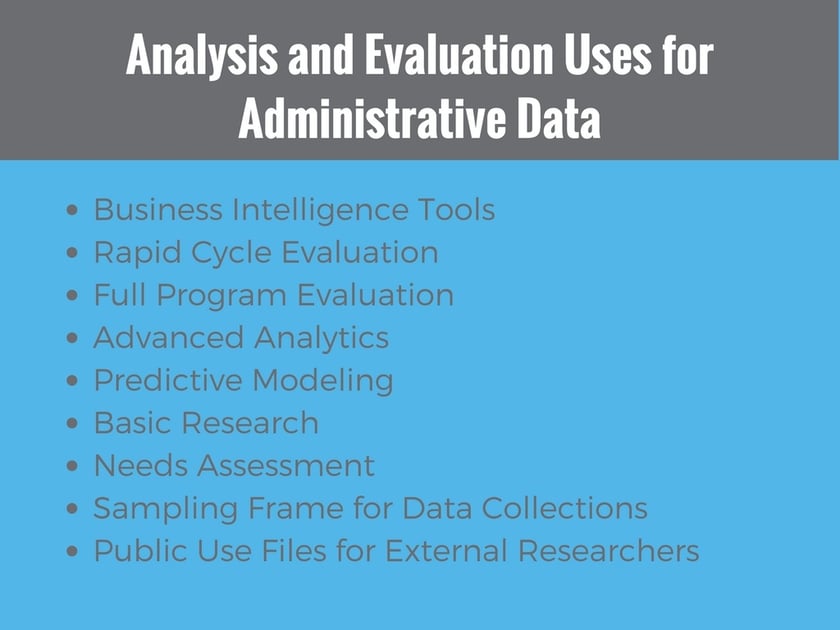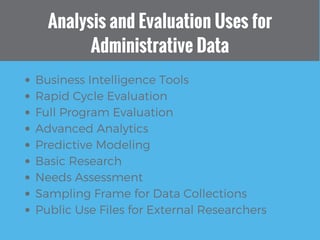How Can I Use My Administrative Data for Analysis and Evaluation?
September 11, 2017 •Anthony Curcio

 In the previous post, we discussed the many advantages of using administrative data for analysis and evaluation. At this point, you might ask, “Great, but how can I use my administrative data for analysis?” Your organization is adept at using the data for performance monitoring, compliance reporting, or grants management, but may be unsure about other ways the data can be employed. The good news is that with forethought, preparation, and some creativity, your administrative data can support a wide variety of analyses and evaluations.
In the previous post, we discussed the many advantages of using administrative data for analysis and evaluation. At this point, you might ask, “Great, but how can I use my administrative data for analysis?” Your organization is adept at using the data for performance monitoring, compliance reporting, or grants management, but may be unsure about other ways the data can be employed. The good news is that with forethought, preparation, and some creativity, your administrative data can support a wide variety of analyses and evaluations.
Business Intelligence Tools
Beyond immediate performance monitoring, your organization’s data can serve as the foundation for in-depth and extensive business intelligence tools and reports. Compiling detailed information on participants and/or program sites into interactive dashboards can help front-line staff provide better and more customized services. Likewise, creating periodically updated custom reports based on the goals, activities, and outputs of each program site over several years (or quarters) can help site managers better understand their site’s performance trends. Finally, linking your administrative data with external sources such as the American Community Survey, can provide a clearer perspective on the needs and circumstances of your program’s participants.
Evaluation
Administrative data is also well-suited to support a wide range of evaluation projects, from rapid cycle evaluation to full impact evaluations. Rapid cycle evaluation, which is designed to quickly test whether targeted operational changes improve program effectiveness, can be easily implemented using the organization’s own, regularly collected data. Likewise, quasi-experimental impact evaluation methods (e.g. Regression Discontinuity Designs, Propensity Score Modeling) were specifically designed to be used with observational data, which includes administrative data. Finally, with appropriate planning, administrative data can even support Randomized Controlled Trial impact evaluations.
Advanced Analytics
Utilizing your organization’s administrative data opens the door to many avenues for advanced analytics. For instance, the longitudinal nature of most administrative data can help your organization validate its performance metrics and evaluate the feasibility and usefulness of its performance goals. Similarly, the wide range of data collected on program participants (e.g. characteristics at start of program, participation duration and patterns, outcomes) can be used to develop predictive models of participant outcomes and behaviors, which can help your organization identify potential drivers of desirable or undesirable participant behavior.
Even More Uses
In addition to direct analysis and evaluation, administrative data can support your organization’s research efforts in many other ways, including: conducting basic research and needs assessments, serving as a sampling frame for in-depth surveys, and dissemination as a public use file.
As outlined above, your organization’s administrative data can be used for many types of analyses, including some, such as evaluation, that usually rely on primary data collection efforts. In the next post, we will review some of the most common challenges of using administrative data for analysis and discuss potential resolutions to these challenges.
Be sure to check out our panel, Data Integration for Program Effectiveness, at this year’s Association for Public Data User’s (APDU) conference.
Get Updates
Featured Articles
Categories
- affordable housing (12)
- agile (3)
- AI (4)
- budget (3)
- change management (1)
- climate resilience (5)
- cloud computing (2)
- company announcements (15)
- consumer protection (3)
- COVID-19 (7)
- CredInsight (1)
- data analytics (82)
- data science (1)
- executive branch (4)
- fair lending (13)
- federal credit (36)
- federal finance (7)
- federal loans (7)
- federal register (2)
- financial institutions (1)
- Form 5500 (5)
- grants (1)
- healthcare (17)
- impact investing (12)
- infrastructure (13)
- LIBOR (4)
- litigation (8)
- machine learning (2)
- mechanical turk (3)
- mission-oriented finance (7)
- modeling (9)
- mortgage finance (10)
- office culture (26)
- opioid crisis (5)
- Opportunity Finance Network (4)
- opportunity zones (12)
- partnership (15)
- pay equity (5)
- predictive analytics (15)
- press coverage (3)
- program and business modernization (7)
- program evaluation (29)
- racial and social justice (8)
- real estate (2)
- risk management (10)
- rural communities (9)
- series - loan monitoring and AI (4)
- series - transforming federal lending (3)
- strength in numbers series (9)
- summer interns (7)
- taxes (7)
- thought leadership (4)
- white paper (15)


